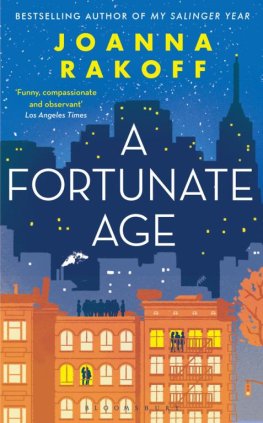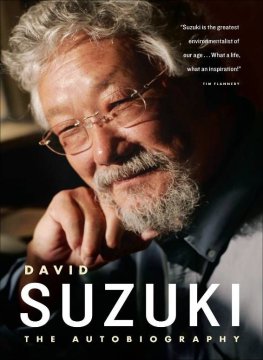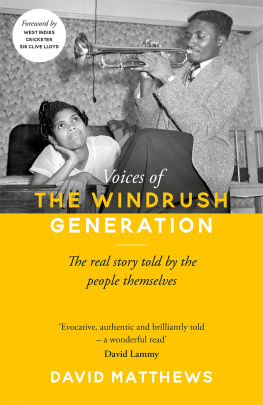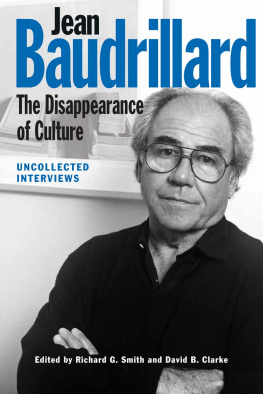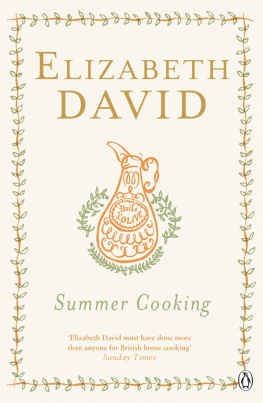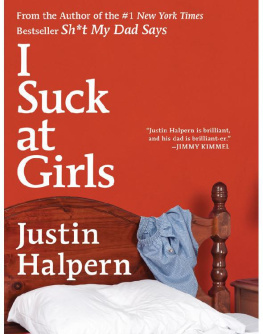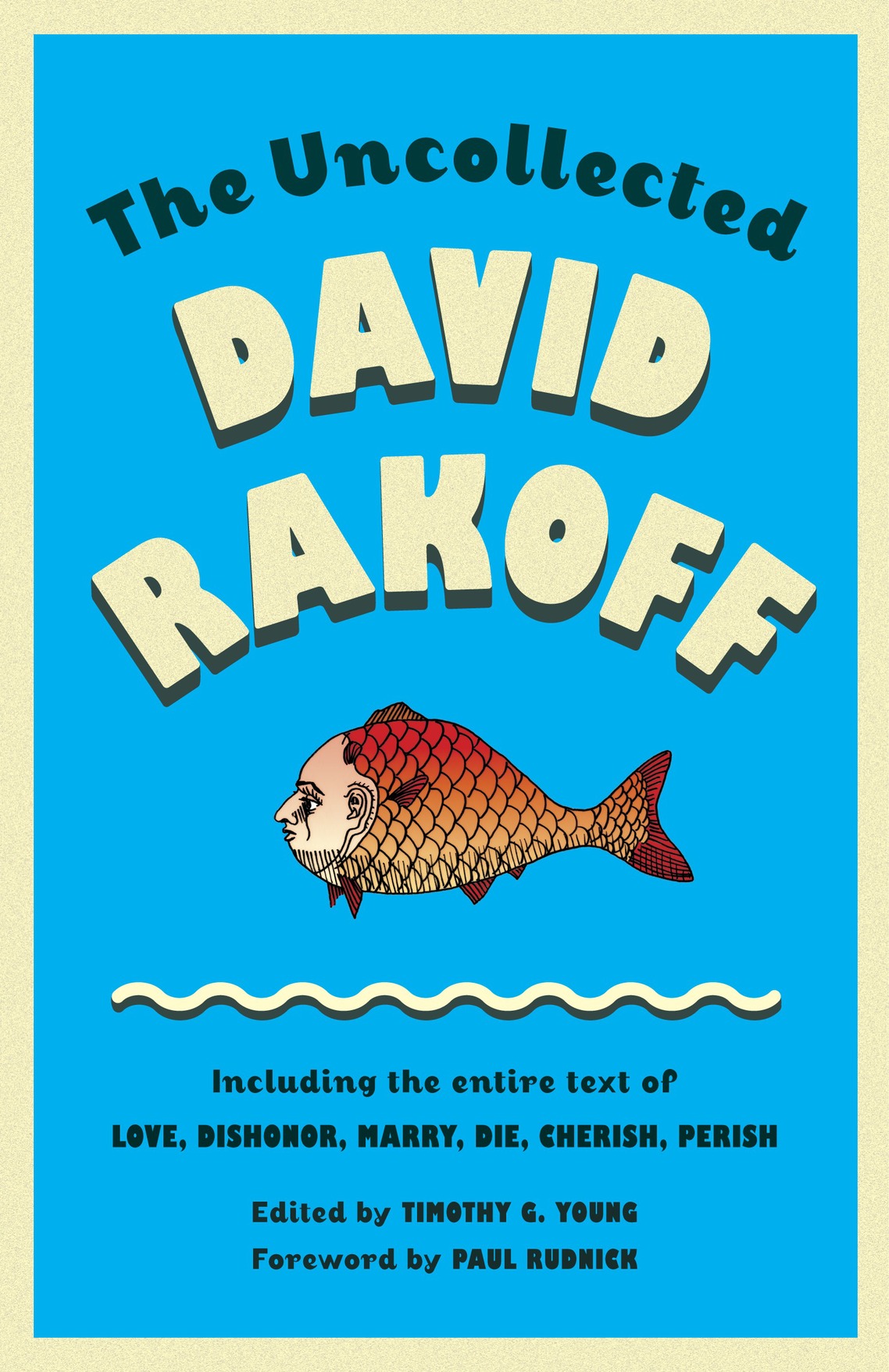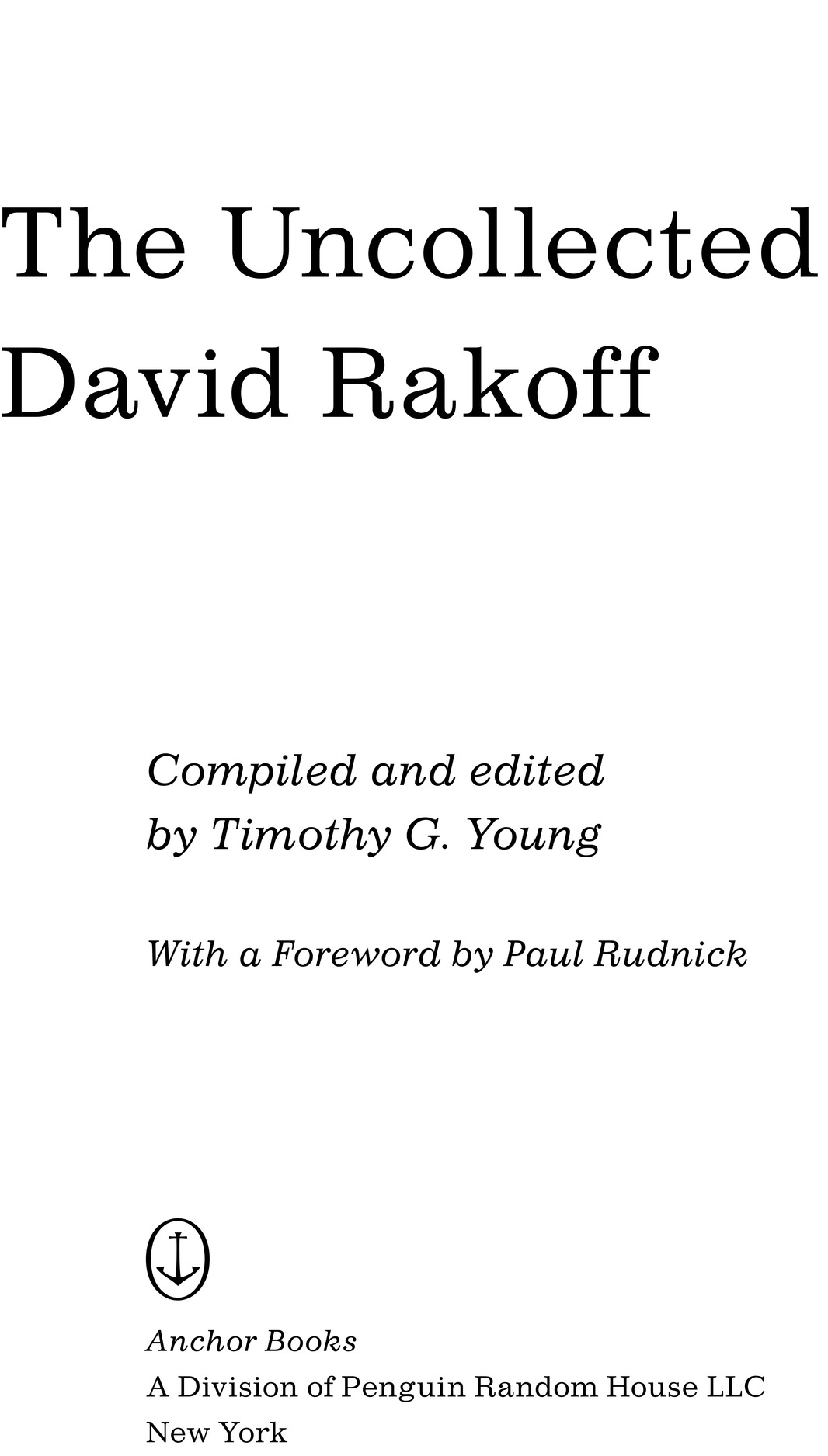The Uncollected David Rakoff
David Rakoff is the author of four New York Times bestsellers: the essay collections Fraud, Dont Get Too Comfortable, and Half Empty, and the novel in verse Love, Dishonor, Marry, Die, Cherish, Perish. A two-time recipient of the Lambda Literary Award and winner of the Thurber Prize for American Humor, he was a regular contributor to Public Radio Internationals This American Life. His writing frequently appeared in The New York Times, Newsweek, Wired, Salon, GQ, Outside, Gourmet, Vogue, and Slate, among other publications. An accomplished stage and screen actor, playwright, and screenwriter, he adapted the screenplay for and starred in Joachim Backs film The New Tenants, which won the 2010 Academy Award for Best Live Action Short. Rakoff died in 2012.
ALSO BY DAVID RAKOFF
FICTION
Love, Dishonor, Marry, Die, Cherish, Perish
NONFICTION
Half Empty
Dont Get Too Comfortable
Fraud
AN ANCHOR BOOKS ORIGINAL, OCTOBER 2015
Compilation copyright 2015 by The Estate of David Rakoff
Foreword copyright 2015 by Paul Rudnick
All rights reserved. Published in the United States by Anchor Books, a division of Penguin Random House LLC, New York, and distributed in Canada by Random House of Canada, a division of Penguin Random House, Ltd., Toronto.
Anchor Books and colophon are registered trademarks of Penguin Random House LLC.
Grateful acknowledgment is made to the following for permission to reprint previously published material:
Farrar, Straus and Giroux, LLC: Letter to N.Y. from The Complete Poems, 19271979 by Elizabeth Bishop, copyright Farrar, Straus and Giroux. Reprinted by permission of Farrar, Straus and Giroux, LLC.
Jonathan Goldstein: Transcript of Oh! The Places You Will Not Go! written by Jonathan Goldstein and David Rakoff, aired on This American Life (PRI), Episode 470: Show Me the Way, on July 27, 2012. Originally aired on WireTap (CBC). Reprinted by permission of Jonathan Goldstein.
WHYY, Inc.: Interview transcripts of David Rakoffs Half Empty Worldview Is Full of Wit and Essayist, Mountaineer, Comic Saint aired on Fresh Air (NPR). Reprinted by permission of WHYY, Inc.
The Cataloging-in-Publication Data is available from the Library of Congress.
Anchor Books Trade Paperback ISBN9780307946478
eBook ISBN9780307946485
Cover design by Linda Huang
Cover illustration by David Rakoff
www.anchorbooks.com
v4.1
ep
Contents
Foreword
I saw David Rakoff onstage before I ever read him. He was playing a beleaguered social worker in One Woman Shoe, a play by Amy and David Sedaris, which dealt with homeless and downtrodden women being required, in exchange for their welfare checks, to perform one-woman shows. Rakoff was elegant, absurd, and hilarious, as he was in all media. Many of his most delicious essays are included in this addictive volume, an ideal companion to his classically cranky collections Fraud, Dont Get Too Comfortable, and Half Empty.
David is my favorite breed of artist, because his work promises pleasure. Whenever Id see his name, online or in a magazine or anywhere else, Id either catapult right to his words or Id save them for last, as an earned dessert. David was, as he put it, a sophisticated sissy, the wayward child of Canadian therapists; he quickly and forever became a passionate New Yorker. He could be acerbic, noting the perils of nostalgic marketing by imagining an ad campaign with the tagline Hitler wore khakis. He decried the homogenization of his adopted hometown, claiming, They used to use Toronto as a stand-in for New York in movies, but now I think Torontos probably too gritty and real.
David could also be ardently appreciative, whether swooning over Sinatra, early Nora Ephron, or a group of simply clad tourists, of whom he declares, Those Mennonites are fabulous! One of my all-time favorite Rakoff pieces is a sympathetic deconstruction of the childrens book Stuart Little, which features a mouse given to sailor suits and professorial tweed, and carrying a cane and briefcase. This piece, which is included here, is titled The Love That Dare Not Squeak Its Name. David remembers having the book read to him in second grade and deciding that Stuarts courtly manners and dandy tendenciesmade me realize that I was somewhat like Stuart and that Stuart seemed, somewhat like myself, pretty gay.
The book also includes transcripts from some of Davids many appearances on NPR, which led to his enduring popularity, although in one of these interviews he describes soap opera fame as being fame of a very specific sort. Its actually not unlike public radio fame, you know? These transcripts are invaluable, especially when, while analyzing his acting career, David insists that hes usually offered stereotypical roles as Jewy McHebrew or Fudgy McPacker.
David was often sent, as a journalist, on semi-exotic excursions, including a visit to a crafting colony where he created an elegant egg basket that resembles nothing so much as a pair of human buttocks in rattan. He doesnt condescend to the colony, declaring instead The week I spent there is about as close as it gets to my idea of paradise. Hes never merely clever or modishly caustic, and his love for New York was unabashed: Look Around You! Every jaunt, every stroll, every errand brings you into contact with someone not like you. David is, above all else, a class act. His work is devastating, hopeful, and yearning, and his self-awareness becomes a form of Manhattan grace.
Which brings us to the books double crescendos: first, Davids masterpiece, his novel in verse, Love, Dishonor, Marry, Die, Cherish, Perish. For ignorant folks like me the designation a novel in verse sounds like a warning from some literary Surgeon General, as in May cause death by mind-numbing pretension. But thanks to Davids giddy genius, Love, Dishonoris an airy, profoundly charming, and irresistible epic, and it has become a beloved touchstone to countless readers.
David died only a few months after completing Love, Dishonor, and thats how we arrive at this collections final and heartbreaking entry: the transcript of Davids last televised appearance on This American Life, at which time hed already lost the use of his left arm, to the cancer that would soon kill him, at forty-seven. David was wary of being defined by his illness; he says, Ive always bridled at the term memoirist because Ive wanted to be known for the quality of my writing as opposed to the particulars of my biography. This does not become an issue, because David treats his disease with the same mordant, incisive flair as any other topic.
He walks onstage and mentions that I danced a lot, all through my childhood.Its an incredibly generic trait for a certain type of boy. Like a straight boy being obsessed with baseball, except its better. He remembers once feeling that If I just buckled down to the great work at handthen my best self was just there right around the corner. He claims to be done with all that, and done with so many things, like dancing.


